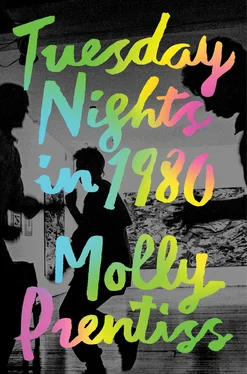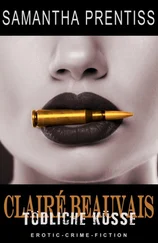It was confusing, this love of thinking, and James didn’t know quite what to do with it. He came from a family where thinking had been considered basically unnecessary: his father had once smacked him when he had asked a question about The Red Badge of Courage at the dinner table, and his mother’s only conversations took place with the characters she watched on television —Don’t marry him, Marcy! Don’t do it! — and in this setting, the idea of thought for thought’s sake was hard to think about. He kept epic journals, pouring his thoughts onto the small square pages, but it felt like it was disappearing into an abyss — he deeply wanted someone to understand him, to communicate what he felt and saw with another person. With a lot of other people, maybe. With the world, even, that screamed out to him with all its colors and feelings and pain.
It wasn’t until junior year, when he scribbled a rant about a student show by a woman whose drawings he quite disliked (the pictures were as rigid as wood, he argued, but weak enough to karate chop in half), and the review was somehow found (okay, he left it in the editor’s mailbox) and published in the Columbia Daily Spectator under the clever headline “Board-Stiff,” that James discovered he could write, and write well enough to be offered a position at the school paper. And it was only after Marge Hollister, the artist whose work he had criticized so ruthlessly, approached him in the quad, shoved him up against a lonely tree, and gave him a violent kiss because he had “made her rethink everything about everything ,” that James realized he might have found his calling, and switched majors again, this time to journalism.
“You’re an odd writer,” his first journalism teacher told him. “But there’s influence in oddity.”
Just after they met, Marge Hollister began making an entirely new kind of art (cutting up advertisements from women’s magazines and drawing on top of them), disapproved of by her professors but ringing much truer to James, and he realized his professor could be right, that perhaps he could influence the way art was thought about and developed, the making of things, with mere words . And when he finally fucked Marge Hollister in the stacks of the library (the third sexual encounter of his life, if you counted the time Grace had brushed over his area in the back of her father’s car) and then fell in love with Marge Hollister harder than he had ever fallen in love with anyone before (how could he not have, when her red was so wonderful?!), James realized his life was not on paper what it had been in his mind, and that it would never be. He thought of Flaubert’s depressing yet relevant quote: “One becomes a critic when one cannot be an artist, just as a man becomes a stool pigeon when he cannot be a soldier.” Perhaps he was a stool pigeon. Fine! He was born to be a critic, not an artist. He was born to be with Marge Hollister, maker of odd collages and impulsive love. He was born to turn the things that he actually wanted into things he wanted only after having them, just as he was born to feel one thing when he looked at another.
SIX: WILD STRAWBERRY/LOVE
At first he had been nervous to tell Marge about his condition, scared he might ruin the whole thing, that he might never get the opportunity to do what they had done in the musty Eastern Religions section of the library again if he did. He had once been stupid enough to confess to Susie Lovett, whom he had loved from afar through high school, that she smelled like buttery popcorn, and though he tried to explain to her that she didn’t actually smell like buttery popcorn, she just felt like how buttery popcorn smelled, which was a good thing, she refused to speak to him after that and began wearing too much of her mother’s perfume, which almost, if not totally, diminished the butteriness he so coveted. But the dirty hem of Marge’s long skirt and the easy way she laughed had made him think that she might be different. That she might get it. And if she didn’t get it, she still might like it , when he told her that having sex with her was just like eating a wild strawberry. That she was red, juicy, full of little seeds, and that when he was finished, he could still taste her sweetness for hours.
“Having sex with you is just like eating a wild strawberry,” he had confessed, as they walked across campus to the building where she had Intro to Art History and he, a course called Introduction to Connoisseurship, in which they were currently addressing “questions of relative quality” in modern art. And, perhaps because wild strawberries were a less savory and more sensual metaphor for love than buttered popcorn had been, or maybe because she really did get it, Marge had embraced the strange comment with her hoarse, pretty laugh, which was just as red, juicy, and sweet as the sex had been.
“You felt like a banana,” she said, with another big laugh.
This exchange had prompted James to lose his breath, gasp for it again, and then trip on a ledge of uneven sidewalk. And because she laughed off his clumsiness and kissed him when they parted for class, her redness stayed all through Connoisseurship, making him feel, for once, like a connoisseur of women . And when the professor, a wool-vested spaz who wore a gold wedding ring shaped like an ear (his wife’s ear, he later divulged to the class at a bourbon-laced mixer), lectured on the ways to tell an original work of art from a fake, James felt red and sturdy himself, knowing he had found an original, that his Marge possessed all the qualities of the real thing, and that what he was experiencing was the authentic and persistent blooming of real love .
That first summer, James and Marge did that thing that new lovers did: sequestered themselves from society in order to revel in each other’s eyeballs, earlobes, lower regions, arm hairs, armpit smells, toes, kneecaps, and lips. Because neither of them had any income to speak of and both their leases were up, they moved into a tiny studio apartment that cost practically nothing — way, way uptown — with a sink that was also a bathtub. They had more sex than James had dreamed was possible. They talked for hours every night, sipping beer or puffing on a joint Marge had rolled or sometimes just reading side by side, then repeating whatever they had read to the other person, so they would both know the very same things.
He often explained to Marge the sensations he felt or the colors he saw at any given moment.
“You know Gordon? From Philosophy 2? Just looking at him makes me taste sweat.”
“Sweat?” Marge said, laughing. “Like, human sweat?”
“Human sweat,” James said.
“And how, my love, might you know what human sweat tastes like?”
“Because I taste it whenever I look at Professor Gordon.”
Marge cackled. “You’re officially nuts,” she said. “Now tell me another one.”
James went on to tell her how their apartment, being inside of it with her, felt like a slippery oyster in his throat, and how Marge’s friend Delilah, with whom they ate lentils once a week at the communal brownstone she lived in on the other side of campus, put him in the mind of the word fawn. Whether she understood or not, Marge listened easily and with interest, saying always: Another one. Tell me more.
Marge, in turn, told James winding tales about the all-girls boarding school she had gone to up in Connecticut, where she was always getting into trouble. She waxed poetic about the cigarettes she had sneaked, the adult books she had bought from the back room of the local bookstore and circulated around the dorms, the time they snuck out to the all-boys school five miles away and got caught on their way back, close to 4:00 A.M. As her punishment, she was made to recite Shakespeare for three hours without stopping, but when she was finished with her three hours she had kept going, just to spite the teachers. “Much ado about nothing,” she had said lightly when she finally gave it up, and had sauntered back to her dormitory, unscathed.
Читать дальше












